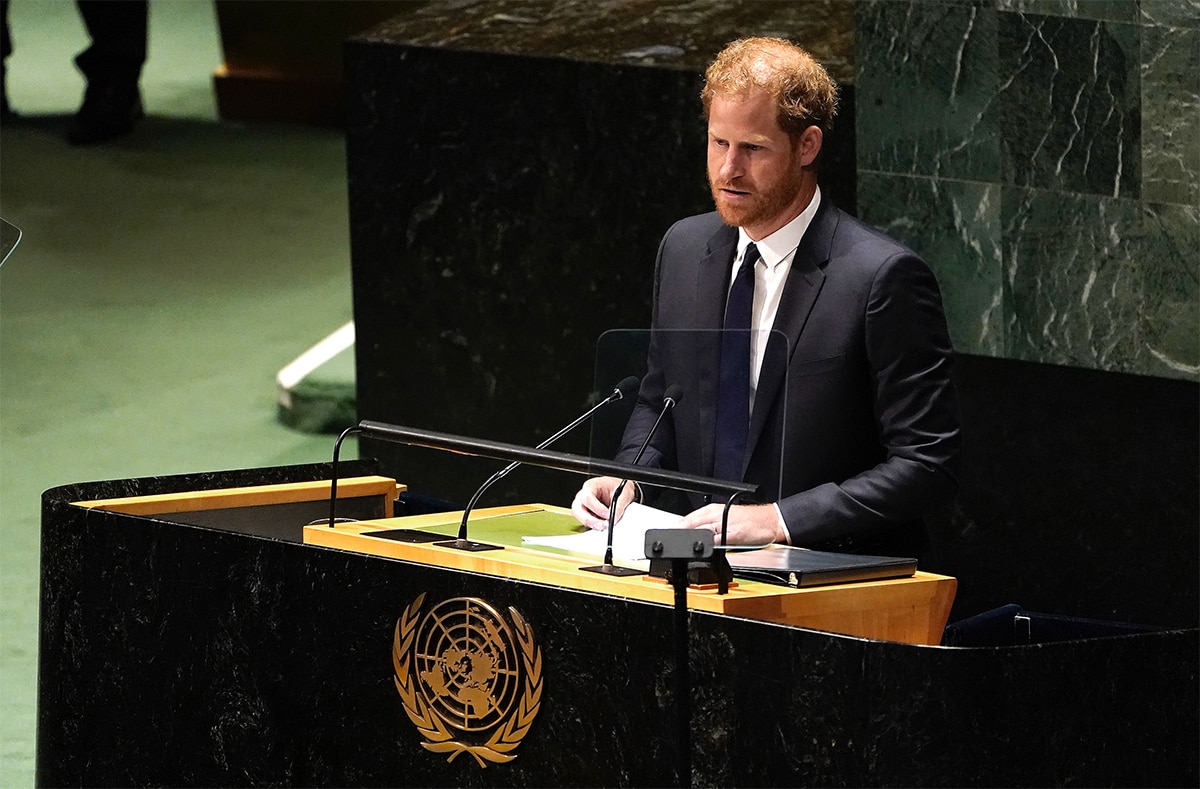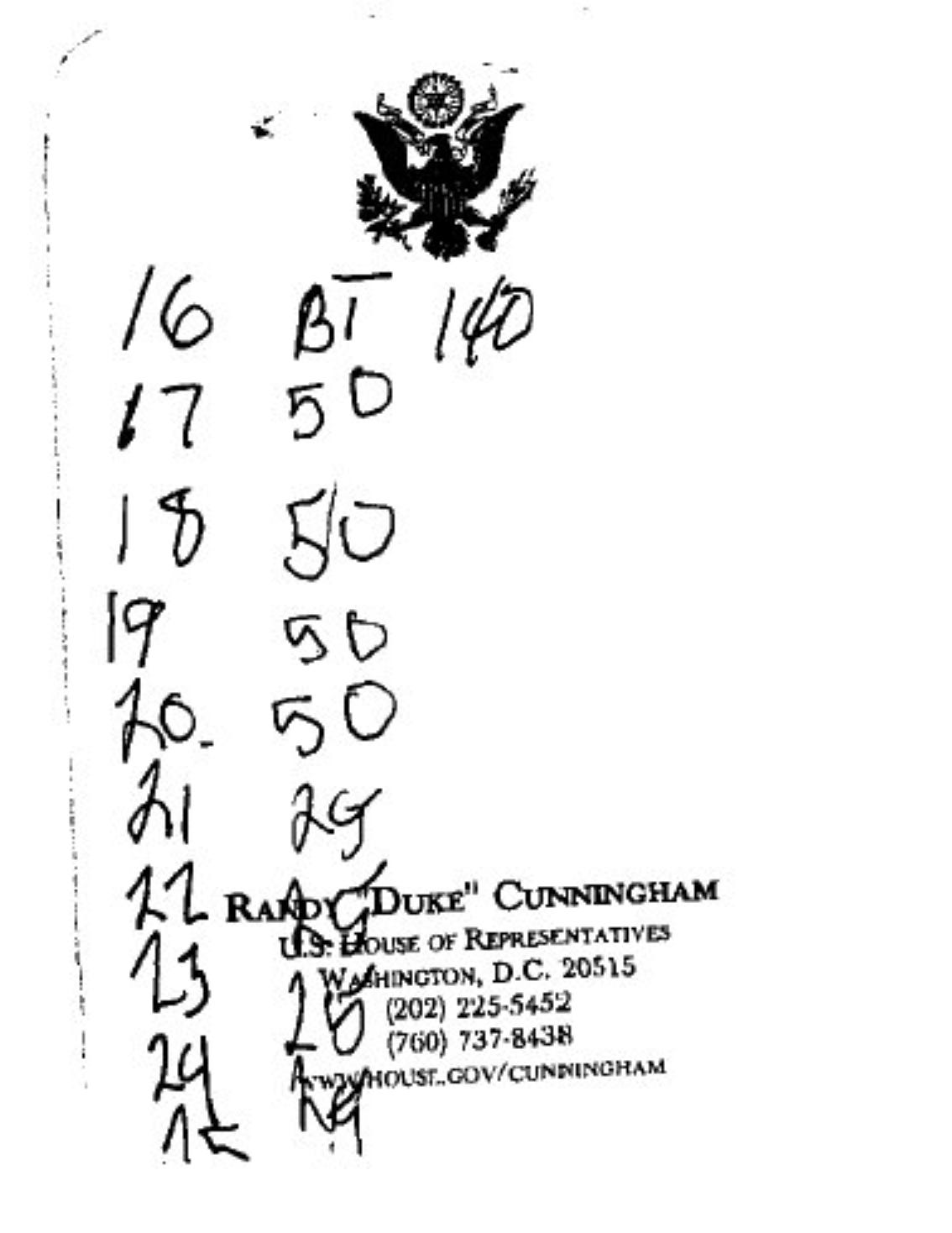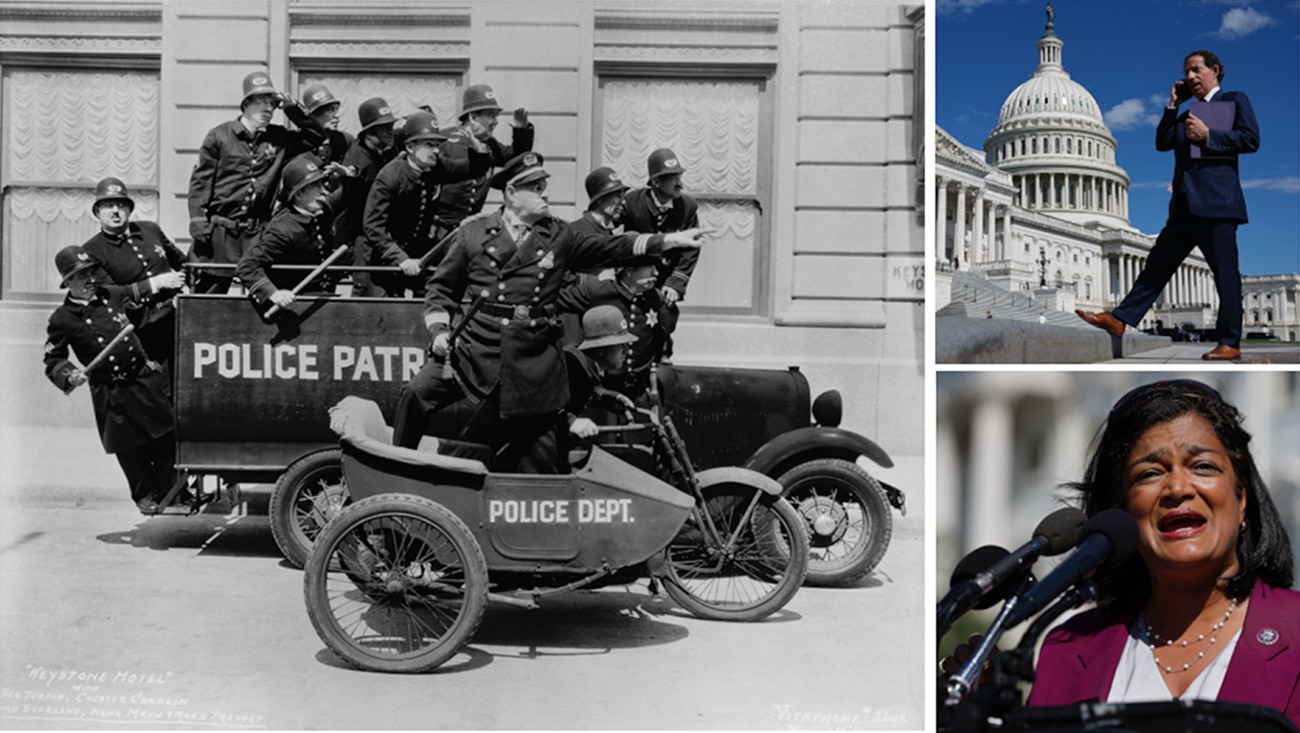

Prince Harry addresses the U.N.
by Matt Taibbi | Jul 20, 2022
Fifteen years ago, as the Bush years waned and political division began skyrocketing, one thing everyone agreed on was that “earmarks” were bad. A trifecta of scandals involving prison-bound congressman Randy “Duke” Cunningham, Republican super-lobbyist (and future Kevin Spacey role) Jack Abramoff, and a $320 million “bridge to nowhere” exposed an intricate system of legalized payoffs both parties scrambled to oppose.
Earmarks, those handy appropriations tools congressfolk used to slip million-dollar favors into the budget, had been ballooning in number for over a decade and looked so bad upon reveal, “corruption and ethics” became the top issue in the 2006 midterms. The Cunningham affair was the worst, featuring a congressman who wrote a “menu” of bribe services (he should have consulted Stringer Bell for legal advice there) and handed out tens of millions in dubious deals to a defense contractor named Mitchell Wade. The San Diego Tribune reporter who broke that story explained:
In return, the contractor showered the congressman with gifts — helping him finance a mansion in Rancho Santa Fe, a condo overlooking the nation’s capital, exclusive use of a yacht on the Potomac, antiques, private-jet travel and prostitutes.
Fast forward to last week. As January 6th hearings, a presidential fist-bump, and a Kardashian spawn’s gender reveal gobbled attention, the House quietly passed a monster $839 billion defense package. It was “the definition of a bipartisan bill,” chirped Alabama’s Mike Rogers, as 180 Democrats and 149 Republicans joined to smash by tens of billions previous records for military spending. With this already underreported story, just one news outlet, Roll Call, described a “first of its kind” report published by the Department of Defense Comptroller’s office, which revealed at least $58 billion of “congressional additions” above Joe Biden’s budget request.
As former Senate aide and defense budget analyst Winslow Wheeler puts it, these “additions” are “not (all) earmarks under either the House’s or Senate’s shriveled definition of them, but they are all earmarks… under the classic understanding.” What’s in those requests? As Roll Call’s Donnelly explains, the $58 billion included “money to respond to disasters and the war in Ukraine,” but also:
Billions of dollars in weapons the military did not seek, such as more than $4 billion worth of unrequested warships, many of them built by the constituents of senior appropriators.
This felt like Duke Cunningham days, back with a vengeance. The $58 billion revealed by the Department of Defense only pertained to “congressional increases” larger than $20 million. I asked the DoD to ask if they also counted smaller appropriations. So far, they’ve declined to comment, but according to several sources (and Roll Call), the actual amount of “additions” is almost surely far higher than $58 billion.

Duke Cunningham’s bribe menu. Note the price change at $20 million
Both the triumphant return of the earmark and the enormous defense hike should have been big stories. To put $58 billion (at least) in defense “increases” in context, the amount of overall federal earmarks in 2006, the infamous year that prompted so much outrage, was said to be $26 billion. Meanwhile Biden’s one-year arms increase exceeds the pace of Donald Trump’s infamous $200 billion collective defense hike between 2017-2019. These are major surges past the levels of both pork and weapons spending that had progressives roaring for “change,” yet there’s almost zero outcry now. Why?
It feels like just the latest echo in a prolonged, very successful re-marketing effort. In 2008, disdain for the “War on Terror” propelled Barack Obama past Hillary Clinton, and failures in Afghanistan and other factors after Obama’s election soon led to the ultimate Beltway horror, i.e. proposed budget cuts. A Reuters story from early 2011 details the misery gripping the Pentagon after Obama suggested cutting $78 billion:
The proposed cuts, unveiled at a somber Pentagon briefing on Thursday, follow increased White House and congressional scrutiny of military spending, which has doubled in real terms since the September 11, 2001, attacks.
From that point, however, the U.S. embarked upon what geopolitical analyst Christopher Mott calls the “millennial rebrand of the neoconservative project,” and the Pentagon’s fortunes rose anew. In the Obama years, think-tankers, pundits, and other actors began to push inverted, left-friendly versions of Bush’s rejected military utopianism, this time focusing on using force to achieve social justice aims abroad. It worked, brilliantly.
In an entertaining and provocative paper for The Institute for Peace and Democracy called, “The Coming Confluence Between Social Justice and Neoconservatism,” Mott details how from the Puritans through McKinley and Wilson and the Cold War and especially through the presidency of George W. Bush, Americans viewed foreign policy not in terms of clashes of idiosyncratic regional interests, but as grand battles of good and evil. This was part of a worldview that placed “universalist narratives at the center of the human story,” narratives that needed tweaking for each era.
Progressives after 9/11 rightly mocked missionary ideas emanating from Washington about America protectively spreading “benevolent hegemony” and defeating a KAOS-like “Axis of Evil” (read: unconnected antagonist regimes) so long as they were pushed by hated neocons like Bill Kristol and David Frum. The new messianism was high comedy. First, the new president had just finished refuting the ideas for which he soon became famous. Pre-2000 Bush not only said it wasn’t the job of the U.S. to be the “world’s policeman,” he snapped in a debate with Al Gore, “I mean, are we going to have some kind of nation-building corps from America? Absolutely not.”
Then 9/11 happened and Bush took what for him was a familiar psychological step of absolute religious conversion, proclaiming he was “ending tyranny in our world” and backing his talk up with actions so over-the-top in their half-coherence that the rest of the world began to view America itself as a hilarious but terrifying satire:
No matter how crazy, politicians never heard pushback when making no sense, be it Don Rumsfeld pleading for vigilance against “the ones we don’t know we don’t know,” or Bush imploring, “the more successful we are on the ground, the more these killers will react,” or Ari Fleischer’s classic, “9/11 should be a vivid reminder to everyone about how vulnerable our country is, and that’s why we need to win in Iraq.” The idea that ranges of really unconnected things were connected was never challenged, even after notes of Rumsfeld’s about sweeping up “things related and not” revealed false connections as an intentional strategy. One university study on the media showed even the most loaded terminology was virtually never questioned, with one journalist saying it would have been like “pissing on it” to write, “The so-called ‘War on Terror.’”
When Bush stepped down, all this madness seemed over. Instead, the rebrand commenced. “It kind of took off about 10 years ago, with Kony 2012,” Mott says, citing the mega-viral social media campaign prompted by a YouTube film produced by a group called Invisible Children. Kony 2012 is a brilliant piece of low-budget filmmaking that documented the journey of a boy named Jacob to escape the clutches of Ugandan warlord Joseph Kony. It targeted progressives and quoted activists who directed millions to send letters to government leaders, who’d be so overwhelmed that it would “[become] in the national interest for the United States to respond”:
After Oprah Winfrey, Justin Bieber, Kim Kardashian, and Rihanna shared it, Kony 2012 rose from 66,000 to an incredible 100 million views. This happened just as we were learning the Obama administration was expanding a military footprint in Central Africa, even sending troops secretly to take on Kony’s Lord’s Resistance Army. Though that effort never turned into a full-blown conflict, Obama had by then also adopted the UN’s R2P or “Responsibility to Protect” doctrine, which directed the use of multilateral force to prevent “atrocity” events like ethnic cleansing. R2P became grounds for a NATO intervention in Libya.
“Libya was a shift moment,” says Mott. “We decided to have a new war, but it was now explicitly and pretty much entirely underwritten on humanitarian pretext.”
After Donald Trump’s election, “democracy promotion” abroad became intertwined with a Unified Field Theory of regressive political evil. Interventions more and more were framed as humanitarian. In the course of fighting for women’s rights in Afghanistan or using sanctions to confront antiblackness in Cuba or taking on Russian reaction everywhere, we replaced Bush’s language of utopian conquest with new, SJW-friendly terminology.
The “risk of inaction” had long been a conservative trope, an example being Dick Cheney’s “one percent doctrine,” under which you must act if you think there’s even a one percent chance that al-Qaeda will acquire a nuclear weapon. Now, you’re likely to hear the moral peril of doing nothing described from the other side, in terms of the “normalization” of someone like Bashar al-Assad (or Alex Jones, for that matter). Instead of the “enemies of freedom” threatening “the very idea of a civilized society,” we’re urged to rescue “democracy itself” by “confronting autocracies abroad.” Even with the cornerstone media deceptions from the two eras, we switched out one absurd hunt for nonexistent connections (WMDs) for another (Russiagate).
Everything is related. The school shooting in Uvalde? It “undermines the U.S. in the eyes of both its allies and its adversaries, damaging its ability to provide leadership on human rights and increasing its vulnerability to enemy propaganda,” wrote a not-at-all-insane NBC News. Or take a New York Times guest essay of a few days ago, “Putin Thinks He’s Winning.” It argues that one of Putin’s grand objectives is to create a “new world order,” replacing a confrontational “bad West” with a more compliant “good West,” with aid from a global coterie of like-minded evil-merchants:
In Mr. Putin’s thinking… the bad West is declining and doomed while the good West is slowly challenging the status quo with a raft of nationally oriented leaders, such as Viktor Orban in Hungary, Marine Le Pen in France and even Donald Trump in the United States.
This is the exact same ideas as the Axis of Evil, not altered even a little. It’s “we’ll pick these random countries that probably don’t actually have all that much going on between them, but because we don’t like them, we’ll say that they’re part of like a secret cabal,” as Mott puts it. In fact, take Frum’s famed “Axis” speech and rewrite it (you could do it with Frum’s help now, too, hilariously) in the language of upper-class intersectional theory and you get an even sillier, faux-left version of “things related and not,” in which all bad things from Putin to incels to fake news to ableism are one and anyone, even the scions of inherited wealth, can be victims of their Creeping Evil.
“From a horrific war in Ukraine, to the rolling back of constitutional rights here in the United States, we are witnessing a global assault on democracy and freedom, the cause of Mandela’s life!” said Britain’s Prince Harry to the UN Monday. If you thought the Team America years were weird, how does being lectured on the “struggle” by a British royal rate? Harry thinks a fifty year-old American anti-abortion movement and a faraway European territorial war are not only connected, but involve forces linked against Nelson Mandela. Isn’t that every bit as batty as the X=Y=Z logic of Ari Fleischer, or the Fox hosts who thought lesbian professors were in league with the terrorists? It’s the same manic sorting of everything into giant piles of Good and Bad from the Bush years, only delivered in a more pretentious and ridiculous package.
If you questioned the size of the defense budget in 1956, the answer would be, “Are you some kind of commie?” Today, “the shoe is kind of on the other foot,” says Mott. “In the Cold War, it was the leftists at home you had to keep an eye on. Now, it’s the reactionaries.” In a global struggle, a cigar can never be just a cigar, and there’s no such thing as just a defense budget. There’s only the question, “Whose side are you on?” That’s why the same people who howled fifteen years ago scarcely noticed last week’s Pentagon orgy. They’re driving the crazy train this time, and it’s busy work.





0 Comments